|
|
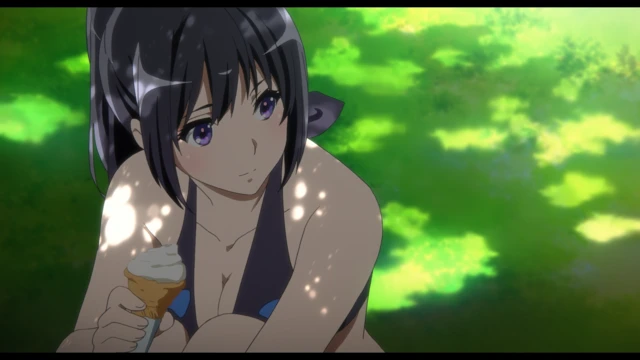
Softcream Summer.
I was mostly ambivalent about Hibike! Euphonium (clumsily localized as Sound! Euphonium) when it first came out, despite being Internet-adjacent to school-band veterans and fans of Kyoto Animation. I basically thought it looked great, but was otherwise mostly merely fine. It's why I've mentioned it so little on this blog. However, in hindsight and with its movies behind me (albeit also sort of a long time ago now), my opinion of the series has improved in retrospect. Meaning, I think I like it more now? Or at least I like what I remember of the series more now.
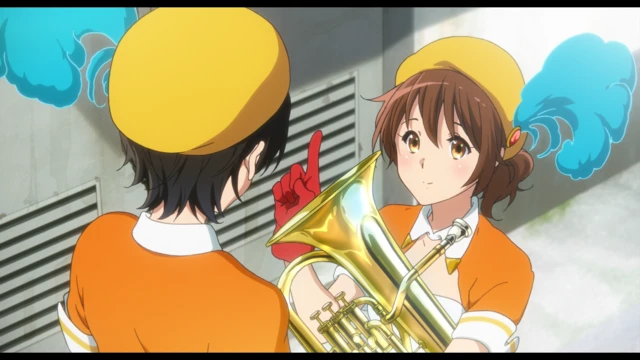
Tall newbie is tall.
However, I don't know if I would actually like it more if I re-watched it. Seeing as how I'm watching relatively few shows during the current season, I could probably just binge watch it all and find out for sure. Other people did. There's a good excuse for it now: A new OVA is already out, and there's even more Euphonium on the way soon.
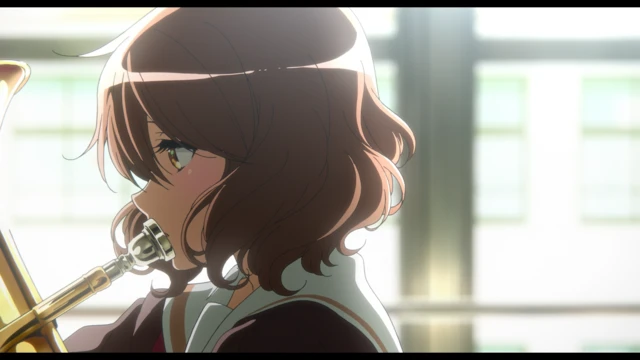
Does this qualify as an Asuka cameo?.
Actually, I did re-watch Hibike! Euphonium Movie 3: Chikai no Finale (Sound! Euphonium: Our Promise: A Brand New Day), and now I'm going to spoil the Bejesus out of something that has been bugging me since I first watched it years ago. (This is your last warning: I'm gonna do it even though Kumiko probably doesn't even believe in Bejesus.) Asuka shows up. She almost certainly used the arrival of Kaori and Haruka as a distraction so she could flank Kumiko and fluff her defenseless poofy hair from behind.
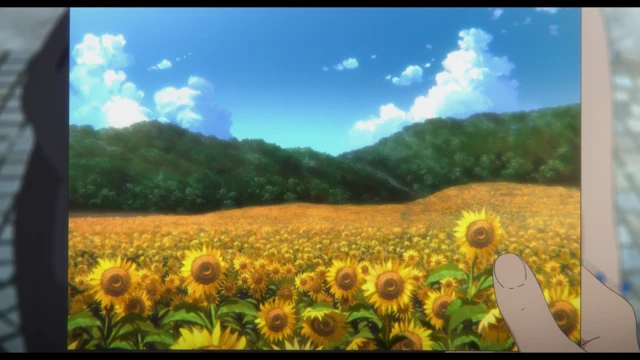
Слава Україні!
And then she disappears in seconds despite (or because of) Kumiko's very obvious desire to reconnect with her. It's how Asuka do. But I gotta ask, "What was on that postcard Asuka gave to her before leaving?" I don't think the movie explains this at all, but I presume the books do. My guess is I'm way overthinking it, and probably it's simply a postcard that Asuka had received and happened to have with her. But by giving it to Kumiko, she indirectly passes along her current address, thereby offering Kumiko a way to reach her in the future. It didn't seem like they had exchanged contact information previously. Anyway, this is a rhetorical question. I'm happy to wait for future Euphonium installments to elaborate on the exchange in due time (or never explain it), even if it means waiting years more.
Posted in Hibike! Euphonium, Hibike! Euphonium 2 | Tags: Autumn 2016, First Girl He Sees Clause, Hair, Instrument Goggles, Kyoto Animation, Movies and OVAs, Re-Watching, Spoilers, Spring 2015, Summer 2023, Superlovely Character Designs, Unrequited Love | Permanent Link
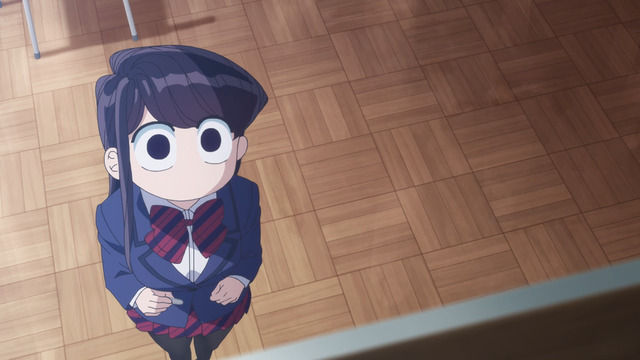
This is the good stuff.
I was only mildly interested in watching the Komi-san wa, Komyushou desu. (Komi Can’t Communicate) anime because I lost interest in the manga fairly quickly. I mean, the basic premise is fine, and the characters are all right, but there wasn't enough going for it to help it compete against all the other titles I'm reading. Honestly, the best thing in its favor was Komi's bug-eyed nervous face when she's confronted with something emotionally challenging.
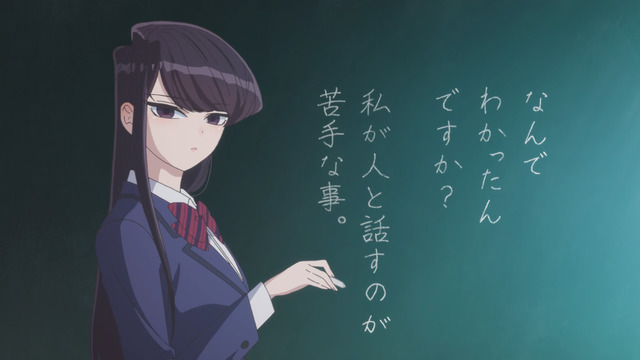
Komi's non-anxious form looks sort of weird, honestly.
Fortunately for the Komi-san anime, this visage is something the anime captured perfectly. The anime also devoted a surprising amount of attention to the shading and texture of Komi's stockinged legs, so maybe I shouldn't be surprised it got her comic form right. This brings me to my main reason for suggesting the Komi-san wa, Komyushou desu. anime is worth a shot: Its animation is unusually high-effort. The production values for this show went above and beyond what I would expect of a series that takes place largely at a school. There are visual flourishes everywhere. It's impressive without becoming distracting.
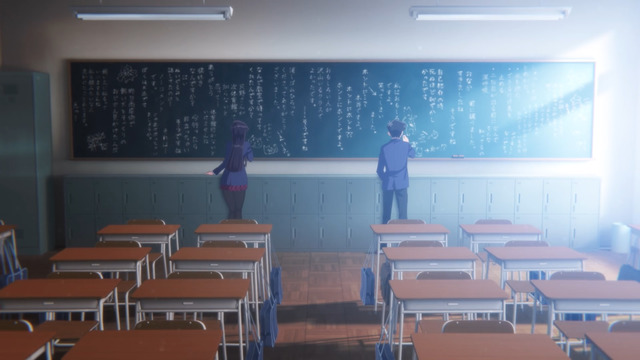
Such is the power of ditching gym class.
With regard to the Netflix, the U.S. release is a few weeks behind the Japanese one. (And it's even a week-by-week release instead of a binge-friendly dump like most typical shows on the Netflix.) Consequently, you may have seen some criticism about the lack of translated on-screen text in the official release, especially compared against what you might expect from, say, a fansub. There is a lot of text that was not translated in the first episode of the official release, but that episode had A LOT of text in general.
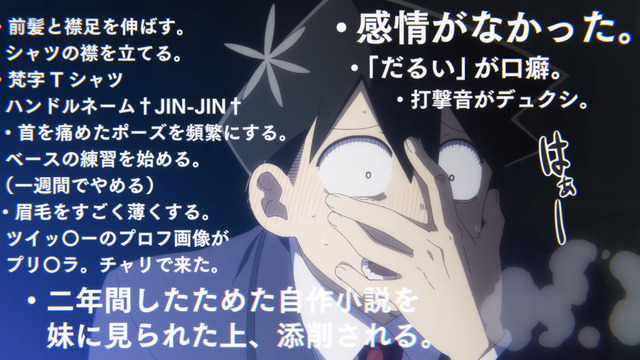
For real, that episode was wall-to-wall on-screen text.
But to be clear, we're not talking about an assault against typesetting in general (cf. the FUNimation's infamous three-line attacks), but rather the Netflix appears to have prioritized what on-screen text was critical to translate and what it could omit because it would either be apparent by context or be too difficult to read without pausing. In that sense, I'm okay with those decisions (at least for the first episode, anyway). Purists who want everything translated, even if it means pausing scenes at various points to read it all will be better off hunting for fansubs, but I don't think viewers who prefer to watch episodes all the way through without interruptions will find the specific omissions in the official release objectionable.
Posted in Komi-san wa, Komyushou desu. | Tags: Autumn 2021, First Episode, First Girl He Sees Clause, Initial impressions, Legs that go up to her neck, Season Introduction | Permanent Link
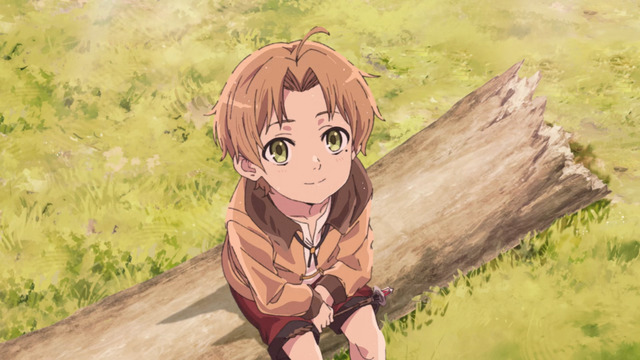
Would he still have ended up a shithead anyway if he didn't have incredible magic powers?
I was first introduced to Mushoku Tensei: Isekai Ittara Honki Dasu (Mushoku Tensei: Jobless Reincarnation or Jobless Reincarnation: I Will Seriously Try If I Go To Another World) years ago when it was only a web novel. Specifically, every single thing I heard about it made it sound terrible, even from readers who enjoyed it. In particular, the protagonist (named Rudeus in his new life) sounded about as despicable as you can make a character, at least according to secondhand sources.
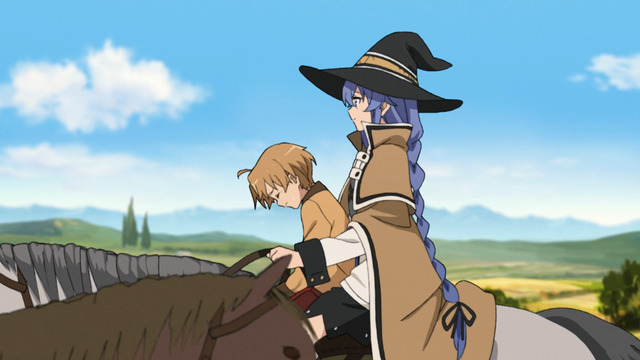
Roxy thinks Rudy only has crippling equine anxiety.
The second episode of the anime adaptation focuses a fair amount on the trauma that led to Rudy becoming a hikkikomori in his previous life. Even as a five-year-old boy in his new life, severe anxiety prevents him from leaving his home or making eye contact with villagers in the countryside. He does seem to get over it, thanks to the assistance of his live-in magic tutor who has befriended the neighbors during the course of her stay. I suppose this does inspire some degree of sympathy, since the anime depicts the bullying he suffered from his point of view and without any context. Still, it's not clear what transpired between his school days and adulthood. We learn he gets kicked out after staying home to masturbate instead of attending his parents' funeral, but it's less clear how he got there, and it's unknown what sort of course corrections—if any—he attempted during his life before reaching that point. The bullying is not enough for me to just give him a pass. In any case, the anime hasn't dwelled too much on his past (at least not yet), probably to its benefit.
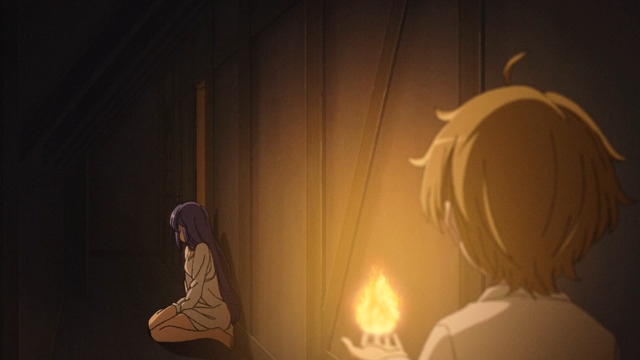
I sort of think Roxy would have noticed this.
The anime does continue to portray him as a perverted child, but there's not any comedic value in it. I presume these scenes are there to help establish a baseline that includes his pre-reincarnation persona and will thereby underscore progress that he makes later in this two-cours series. I'm mostly ambivalent about Rudeus at this point, so that's relatively positive considering I was expecting to loathe him. The anime itself still looks really nice, so I imagine fans of the books must be pleased with how it's turning out. I don't know that I'm going to stick around for two cours of this, but the show seems all right so far. I was expecting more questionable creative choices in the writing, but it seems those impressions may have been web-novel baggage that Mushoku Tensei is not dragging with it into the anime, at least not so far.
Posted in Mushoku Tensei: Isekai Ittara Honki Dasu | Tags: Douche Bags, Fat Anime Characters, First Girl He Sees Clause, Initial impressions, Light Novels, Season Introduction, Sex, Winter 2021 | Permanent Link
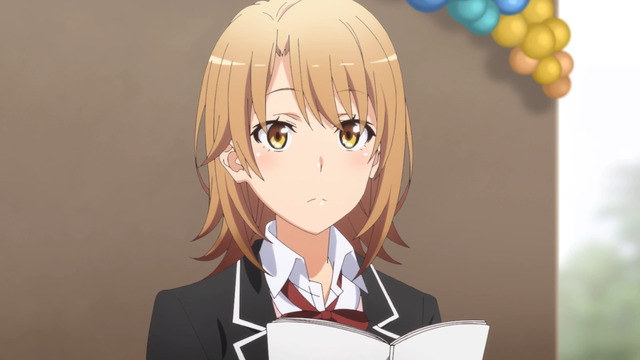
BEST GIRL.
Yahari Ore no Seishun Love Comedy wa Machigatteiru. Kan (My Teen Romantic Comedy SNAFU Climax!, among other localized names) completed the three-season run of a harem comedy that fared surprisingly well despite my initial misgivings. Generally speaking, the term "harem comedy" itself feels anachronistic now and less appropriate even when applied to shows such as Gotoubun no Hanayome (The Quintessential Quintuplets) compared to the label's Love Hina-era association (at least in my mind). I suppose it's probably still applicable for shows such as Kanojo, Okarishimasu (Rent-a-Girlfriend). But I digress.
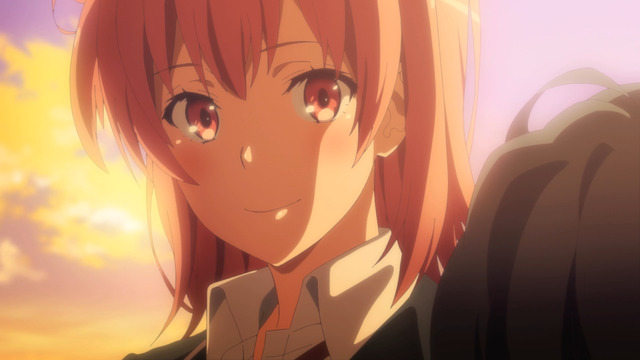
Oregairu might have been a better series if told from Yui's point of view.
These types of shows invoke a competitive element that pits various female protagonists against each other to vie for the male lead's affection, ultimately "winning" by becoming the romantic interest he selects at the conclusion of the series. Longtime readers of this blog may remember I'm not a fan of this construct when the male lead is so frequently a dull sap, to say nothing of the ones who are legitimately terrible cretins. I'm did not watch Kanojo, Okarishimasu, but I did watch it get shredded on the Twitter, and Potato-kun appears to be a colossal douche in addition to the show's numerous other problems. Does the girl who ultimately ends up with such a character really win? [Spoilers: No.]
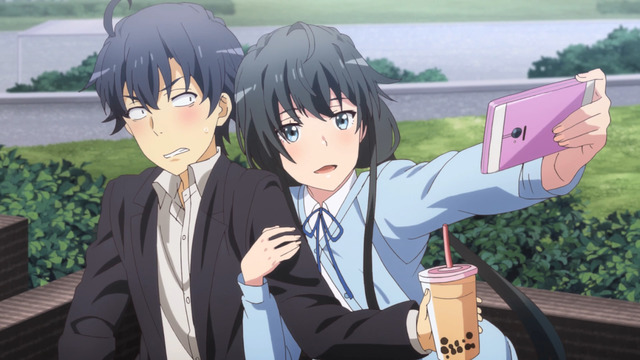
Kids and their selfies.
Oregairu does not suffer from this particular problem, at least by its conclusion. Hachiman in the third season is no longer the same person he was in the first season. Unfortunately, the girl who ultimately "wins" has her own issues. [Spoilers henceforth, obviously, if you haven't already either seen this coming or learned about it via some other way, such as discussions about the light novels' ending.]
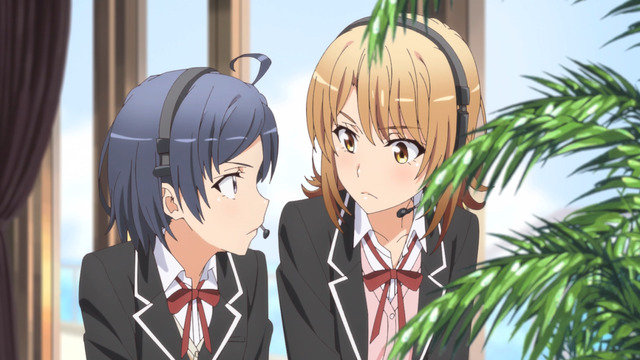
It's about the future, Madam Chancellor.
Yukino is not interesting. She is supposed to be the most complex of the various love interests, and has some significant hang-ups that admittedly align well with Hachiman's character, but I never found her problems or growth compelling. As far as "winning" the harem comedy contest goes, she is the most sensible one to pair with Hachiman, but my lack of investment in their relationship makes the show's resolution somewhat hollow. Ultimately, it was still a good journey, and I can appreciate why Oregairu accumulated so much praise during its run, but I can't quite point to it as a much-watch show by any means.
Posted in BEST GIRL, Yahari Ore no Seishun Love Come wa Machigatteiru, Yahari Ore no Seishun Love Comedy wa Machigatteiru. Kan | Tags: Crying, Douche Bags, First Girl He Sees Clause, Harem Comedy, Light Novels, Love Confessions, Love Hina, Love Triangle, Romance, Season Conclusion, Sequels, Spoilers, Summer 2020, tsundere, Unrequited Love | Permanent Link
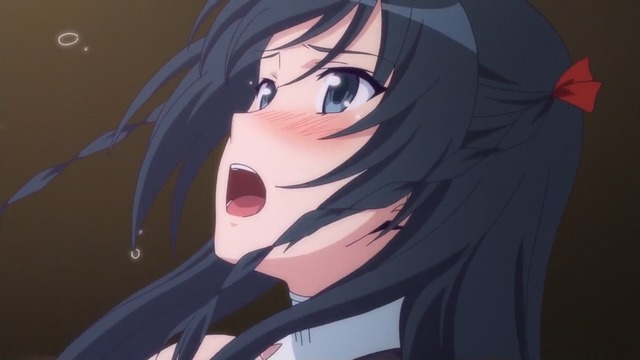
Masou Gakuen HxH leads off the first episode with the Japanese girl in a cold open.
Although trashy fan service shows aren't exactly rare, the full-on, uncensored, blatantly gratuitous ones aren't particularly common either. In recent memory, there was Valkyrie Drive: Mermaid (which I haven't seen yet), and the ever-popular High School DxD series (which is relatively tame as far as these sorts of things go). This season, we have Masou Gakuen HxH (Hybrid x Heart Magias Academy Ataraxia) which is sort of like IS: Infinite Stratos except that in Masou Gakuen, Potato-kun's purpose is to recharge the girls' fighting ability through the power of arousal rather than just standing around wondering why they're all angry with him.
(more…)
Posted in Dakara Boku wa, H ga Dekinai, IS Infinite Stratos, Seikon no Qwaser | Tags: Fan Service, First Girl He Sees Clause, Girls With Guns, Hair, Light Novels, Nudity, Plying Girls, Season Introduction, Sex, tsundere | Permanent Link
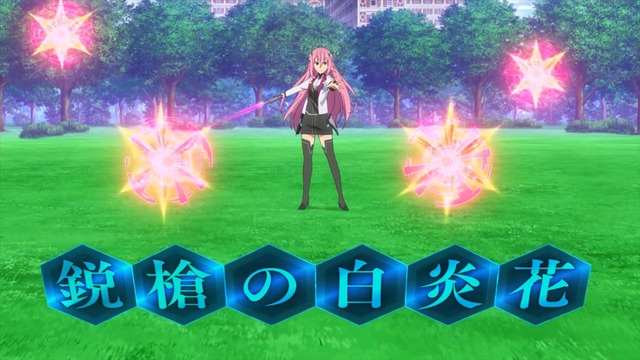
On the plus side, Kakuma Ai sounds pretty good as Julis-Alexia von Riessfelt.
Conveniently, there are two shows this season with similar premises and comparable first episodes. Both feature high school boys who meet half-naked tsundere pink-haired girls and duel them for unnecessary reasons putatively related to their magic school's magic business. The first of these, Gakusen Toshi Asterisk (The Asterisk War: The Academy City on the Water) aired first to, well, not acclaim, but at least without outrage. It looks suitably pretty with shiny cityscapes and bright colors sort of similar to the Toaru Majutsu no Index and Toaru Kagaku no Railgun bullshit academy cities. The second show, for reasons I'm too weary to pursue, has a number of different titles. It's sometimes known as Rakudai Kishi no Eiyuutan, Rakudai Kishi no Cavalry, Chivalry of a Failed Knight, or alternatively A Tale of Worst One. Yeah, I'm just gonna use Asterisk and Cavalry respectively.
(more…)
Posted in Gakusen Toshi Asterisk, Rakudai Kishi no Eiyuutan | Tags: Autumn 2015, Compare and Contrast, Fan Service, First Girl He Sees Clause, footnotes, Harem Comedy, Light Novels, Magic School, Otaku Virtues, Season Introduction, Silver Link, Spoilers, tsundere | Permanent Link
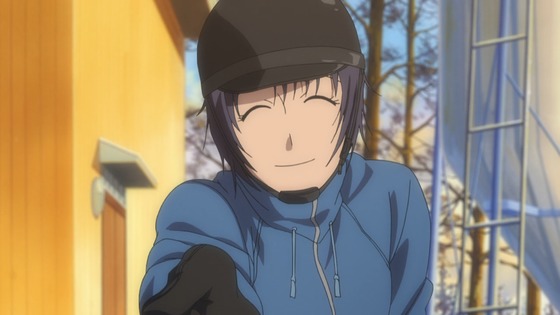
I wonder if the First Girl He Sees Clause is in effect?
I started watching too many shows this season to prepare a single comprehensive summary of how they're all shaking out so far; it would take hours. So I'll just divvy out these introductions individually or in chunks. The best show thus far is Gin no Saji, also known as Silver Spoon. It's a comedy about a boy who enters an agricultural high school and discovers farm life is more difficult than he anticipated. It's based on a manga by the author of Fullmetal Alchemist, Arakawa Hiromu, who grew up on a farm herself. The consensus regarding Gin no Saji appears to be generally positive, but it seems you have to think farms are funny to enjoy it as much as I do.
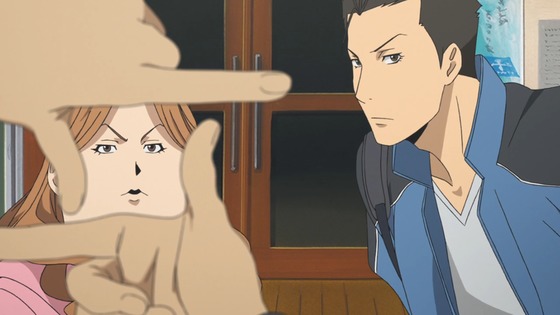
I predict Tamako will be the BEST GIRL in Silver Spoon.
Notably, Gin no Saji lacks any of the high school bullshit (at least through the first two episodes) that plagues other anime set in high school. Because of the hands-on nature of the instruction, it seems more like a trade school and quite alien compared to they typical seat-by-the-window, beautiful-mysterious-transfer-student, oops-I-fell-on-your-boobs, let's-prepare-for-the-culture-festival drudgery that you see in every other school comedy. The anime is already past the few chapters of the manga that I read, so perhaps Silver Spoon will, in fact, get a mysterious transfer student who sits by the window and helps out during the culture festival after a normal boy falls on her boobs, but I'm at least reasonably confident that the execution will be creative and different if that actually happens.
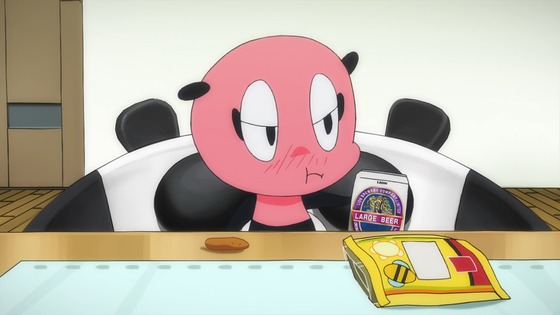
LARGE BEER.
Gatchaman Crowds is ostensibly based on the Kagaku Ninjatai Gatchaman (Science Ninja Team Gatchaman) anime from the '70s, but thus far bears little resemblance to what I know of the original (which admittedly only comes from its two English adaptations, Battle of the Planets and G-Force: Guardians of Space). The biggest difference is the apparent focus on Hajime. I.e., a female lead instead of the familiar male-dominated team of five members: The leader guy, the angry guy, the fat guy, the token kid, and the aerodynamic girl.
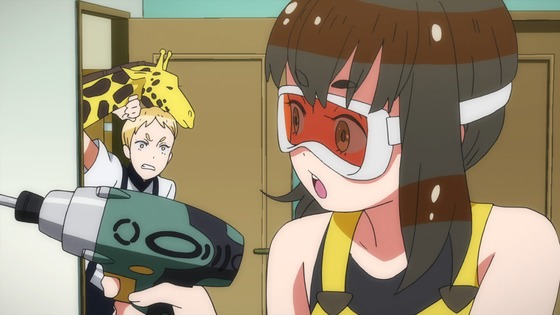
A man's romance.
Hajime, I should point out, is making a solid run for the 2013's Girl of the Year crown with her unrelenting TOP FUEL GENKI attitude. Maybe it will be revealed in a shocking twist later that Hajime is actually broken inside, but for now her ebullience appears ready to overcome all challenges, even the bane of social media. Also in her favor is her bizarre love of notebooks and planners, an obsession I sheepishly admit to sharing (although, unlike Hajime, I don't fornicate with my notebooks and planners).
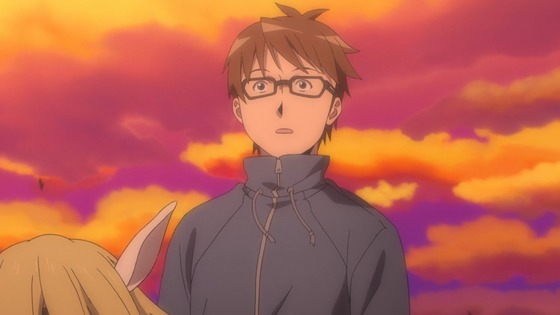
I'm so glad nobody broadcasts in Smell-O-Vision.
For now, Gin no Saji and Gatchaman Crowds are the top two shows of the season, at least according to my tongue-in-cheek ranking system. Whether a comedy about farms and a superhero show arguably about Facebook games can survive the onslaught of a moon-destroying mahou shoujo opera and the return of a college circle of degenerate perverts remains yet to be seen.
Posted in BEST GIRL, Gatchaman Crowds, Gin no Saji, Season Summary | Tags: First Girl He Sees Clause, Girl of the Year, Girl of the Year 2013, Hirano Aya, Season Introduction, Summer 2013, Top Fuel Genki | Permanent Link
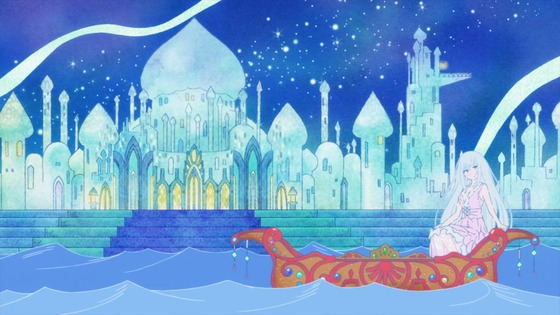
For one thing, only one person's opinion matters.
Ore no Kanojo to Osananajimi ga shuraba Sugiru (My Girlfriend and Childhood Friend Fight Too Much) seems to be doing all right so far in a fairly tough category: The Harem Comedy. I find most fans' tolerance for harem comedies declines with each one they watch. Assuming they ever enjoyed them, enthusiasm quickly transforms into hostility after one too many comely girls inexplicably throws herself at a bewildered, unremarkable boy. The male love interest is nearly always to blame. Despite his harem's collective questionable taste, ol' Potato-kun's lack of assertiveness or any other redeeming characteristic is the reason why viewers find harem comedies increasingly frustrating. In this regard, Eita from Oreshura is at least is off to a semi-decent start.
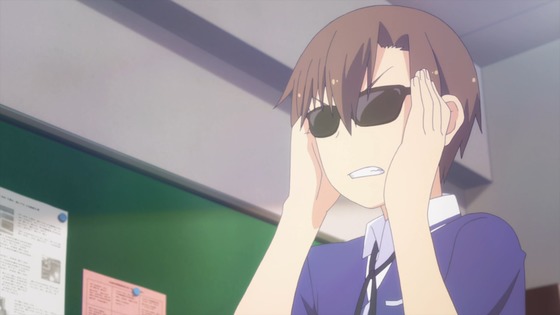
Eita's future is so bright.
First of all, he's not "normal" unmotivated slug. He's at the top of his class and aspires to become a doctor. Prior to Masuzu's shenanigans, he studied constantly. Secondly (and technically these constitute spoilers from the light novels and the manga), he's not terrified of girls. Sadly, harem comedy leads literally frightened of girls seem to be the contemporary norm. Why? Is there no other way to drag out a dozen episodes besides ensuring Male Protagonist and First Girl He Sees cannot canoodle early and often? Or is it so a stereotyped target demographic can identify with him? Are Japanese otaku really as "herbivorous" as certain tabloids accuse? It's not even harem comedy leads who act this way; ol' Hero from Maoyuu Maou Yuusha is a potato, and humans in his world didn't even have potatoes until Demon King planted some.
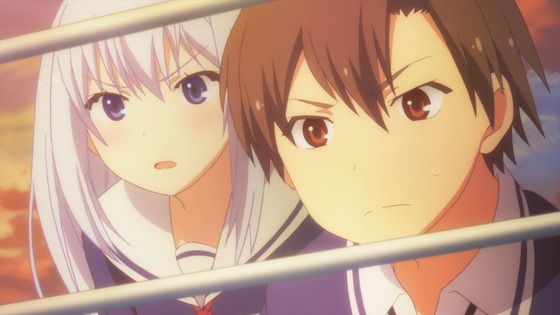
Confederates in "I Can't Believe That Shit Worked."
So Eita is not afraid of girls. This is good news, right? Well, you'd think so. It means he doesn't have any reason not to romance his childhood friend except, well, he just doesn't see her that way. Chiwa sympathizers will likely find Oreshura extremely frustrating in this regard, because he friendzones the Bejesus out of her. Sucks to be Chiwa. Personally, I'm pleased with the show so far because it hasn't been about a bunch of airheads vying for his attention. This does mean Eita ends up being the anime-dense one instead, though. And he is pretty dense. I can only assume towards the end of the show (if it doesn't punt with a non-ending ending), there will be some cathartic moment where he realizes he doesn't only love Chiwa as a friend, but also wants to rail her until she can't walk straight. The end.
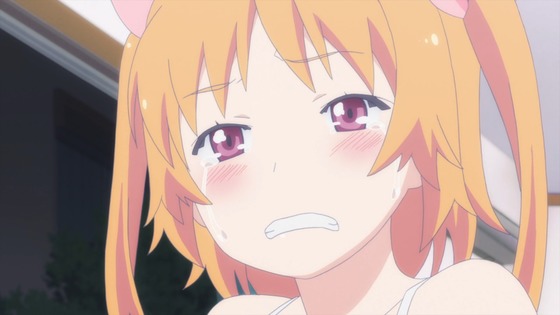
If you advance this scene frame by frame you can
catch the exact moment Chiwa's heart breaks.
Sadly, this conventional formulaic ending is probably the best we can hope for. Personally, I'm expecting a non-ending ending (because the anime will run out of episodes before the light novels conclude), but I believe all these early examples of Chiwa's suffering are intended to promote her placement as the principal love interest. Yeah, Masuzu might be better in every way, even though she doesn't wear any underwear, but Chiwa is a sweet kid and her life kinda sucks, so it's better if she wins. That's good, right? I'm not buying it. Fuck Chiwa. And if she wants people to stop calling her "chihuahua," she should stop wearing a dog collar around her neck.
Posted in Maoyuu Maou Yuusha, Ore no Kanojo to Osananajimi ga Shuraba Sugiru | Tags: Bad Things Happen to Good People, Fan Service, First Girl He Sees Clause, Harem Comedy, Plying Girls, Sex, tsundere, Winter 2013 | Permanent Link
|
|




























